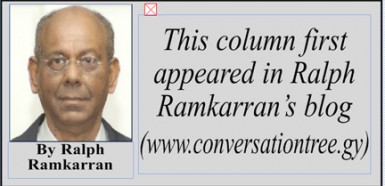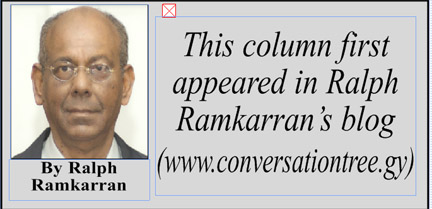I adopt the sentiments of Lincoln Lewis, who writes frequently on constitutional matters. He said in last Sunday’s Chronicle: “We are facing a very serious situation and what I am about to say is intended to right a ship, veering wildly off course and  posing dire implications for the rule of law, the legitimacy of the executive, and protecting the well-being of the society.” Mr Lewis cited the following instances where the authority of the executive and limits of the President have been exceeded: 1. The termination of leases in the MMA; 2. (Mis)Interpretation of criteria for Gecom chair; 3. The termination of Red House lease; 4. Seeking to possess the property of Clarissa Riehl; 5. Instructions given to the Police Service Commission not to act on a list for promotions. While Mr Lewis’s did not explicitly say so, his conclusion is that the court rulings suggest that the constitution is being violated.
posing dire implications for the rule of law, the legitimacy of the executive, and protecting the well-being of the society.” Mr Lewis cited the following instances where the authority of the executive and limits of the President have been exceeded: 1. The termination of leases in the MMA; 2. (Mis)Interpretation of criteria for Gecom chair; 3. The termination of Red House lease; 4. Seeking to possess the property of Clarissa Riehl; 5. Instructions given to the Police Service Commission not to act on a list for promotions. While Mr Lewis’s did not explicitly say so, his conclusion is that the court rulings suggest that the constitution is being violated.
A strong editorial in the Stabroek News of August 21 did not mince words. Additional violations were cited in extenso: “…the directive issued by Minister of State Joe Harmon on June 26 to the Police Service Commission (PSC) in the name of President Granger for the halting of the police promotions process must be condemned as an attack on constitutionalism…Given President Granger’s flawed reading of the constitutional provisions relating to the appointment of a Chairman of the Guyana Elections Commission, his unconscionable delay in acting upon the recommendations of the Judicial Service Commission and the May 2015 attempt by Minister Simona Broomes to issue an instruction to the Public Service Commission, which was later ruled ultra vires by the High Court, a pattern of highly worrying behaviour has emerged. It is clear that when it suits the President and the government to ignore constitutional precepts – in this case the vital insulating of service commissions – it is prepared to do so. Two and a half years into its term of office, this tendency is rife with jeopardies to constitutional rule and the rule of law. It also adds to the unpleasant legend of the PNC’s undemocratic rule of the 70s and 80s, the flying of colours of the party over the Guyana Court of Appeal and the entrenching of paramountcy of the party as enshrined in the Sophia Declaration.”
In the face of criticism the government, instead of withdrawing the offending instructions to the PSC, doubled down and gave excuses for its unlawful conduct. The President said: “We are not trying to trample on the constitutional rights of the Commission but damage can be done if persons, who are not fit and proper, make decisions, which are injurious to public security. We want the constitutional Commission to function efficiently but at the same time we want to make sure that the public can depend on the decisions that come out of that Commission being in the best interest of the nation.” In other words, the government does not want the PSC to select some of the persons recommended. Even though the government can properly place the evidence of unfitness of persons recommended to the PSC and ask it to reconsider, it appears more comfortable in violating the constitution by giving instructions.
In an article, ‘The Constitutional Role and Responsibility of Public Service Commissions and Police Service Commissions in the independent Commonwealth Carib-bean: Much Room for Improvement,’ J Emile Ferdinand QC said: “At this time when the need to reduce crime must be a national priority in our country, practices which promote professionalism in the Police Force should be followed, and those which tend to politicization of the Force ought to cease. To this end, PM Harris ought to break with the practice of his predecessor, which he has so far carried on, of involving himself in approving or disapproving of intended promotions within the Police Force below the rank of Deputy Commissioner.”
Apart from maintaining professionalism, the drafters of the constitution understood that a professional, and not a politically aligned, police force is related to the human rights and civil liberties of citizens. Describing such rights, Chancellor Massiah said in Attorney General v Mohamed Alli (1987) that: “These rights are basal to all civilized societies and derive from mankind’s instinctive desire for freedom and his corresponding hatred for all forms of tyrannical and unjustifiable restraints.”
Guyana had already experienced the subversion of the Guyana Constitution starting with the defanging of the Elections Commission in 1968, prior to the elections of that year. I personally experienced it when I served on a toothless Elections Commission in the elections year of 1973. The list of ‘tyrannical and unjustifiable restraints’ grew long and sordid from 1968 to 1992. This attempt to defang another constitutional body by directives, after several attempted constitutional violations have been rejected by the courts, should not be allowed to succeed. The government can lift its deeply troubling approach to the Constitution by withdrawing the offending letter to the PSC before the court once again embarrasses it by inevitably ordering it to do so.










